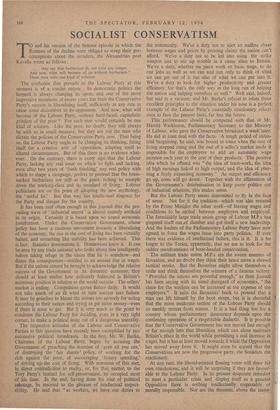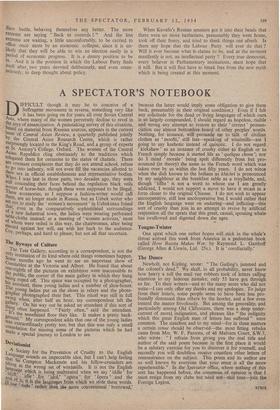SOCIALIST CONSERVATISM
0 end his version of the famous episode in which the Romans of the decline were obliged to scrap their pre- conceptions about the invaders, the Alexandrian poet . .. they say that barbarians do not exist any longer. And now, what will become of us without. barbarians ? These men were one kind of solution.
The confusion that prevails in the Labour Party at this moment is of a similar nature. In democratic politics the leopard is always changing its spots, and one of the more impressive mutations of recent years has been the Conservative Party's success in liberalising itself, sufficiently at any rate to cause some discomfort to its opponents. And now, what will become of the Labour Party, without hard-faced, capitalistic ,grinders of the poor ? For such men would certainly be one -kind of solution. Like the poor, no doubt, they will always be with us in small measure; but they are not the men who dictate the policies of the Conservative Party now. That being so, the Labour Party ought to be changing its thinking, fitting itself for a creative sort of opposition, adapting itself to 'altered circumstances. But of this there is no evidence what- ever. On the contrary, there is every sign that the Labour Party, lacking any real issue on which to fight and lacking, even after two years of 'fresh thinking,' any real policy with which to shape a campaign, prefers to pretend that the brass- necked barbarians are still at the gates, itching to trample down the working-class and its standard of living. Labour politicians are on the point of adopting the new mythology, the community. We've a duty not to start an endless chase between wages and prices by pressing claims the nation can't afford. We've a duty not to be led into using the strike weapon just to stir up trouble in a cause alien to Britain. We've a duty, whether on piece work or basic wage, to do our jobs as, well as we can and not only to think of what we can get out of it but also of what we can put into it. We've a duty to look for higher productivity and greater efficiency, for that's the only way in the long run of helping the nation and helping ourselves as well." Well said, indeed, but said in a vacuum; and Mr. Burke's refusal to relate these excellent principles to the situation under his nose is a perfect example of the Labour Party's essentially reactionary reluct- ance to face the present facts, far less the future.
This performance should be compared with that of Mr. Harold Watkinson, Parliamentary Secretary to the Ministry of Labour, who gave the Conservative broadcast a week later. He did at least deal with the facts. A tough period of indus- trial bargaining, he said, was bound to come when the cost of living stopped rising and the end of. a seller's market made it impossible for the employers to add an automatic wage increase each year to the cost of their products. The positive idea which he offered was "the idea of team-work, the idea of high earnings linked to high output, and the idea of plan- ning a lively expanding economy." As output and efficiency go up, costs will go down. Together with the affirmation of the Government's determination to keep party polities out of industrial relations, this makes sense.
But the Labour Party seems determined to fly in the face of sense. Not for it the tradition—which was also restated by the Prime Minister the other week—of leaving wages and conditions to be settled between employers and employed. The formidably large trade union group of Labour M.P.s has gingered itself out .of slumber and got itself a new leadership.
And the leaders of the Parliamentary Labour Party have now agreed to force the wages issue into party politics. If ever there was evidence of intellectual failure, this is it. It is ho longer to the Tories, apparently, that we are to look for the sadder manifestations of bone-headed conservatism.
The militant trade union M.P.s are the sworn enemies of Bevanism, and no doubt they think their latest move a shrewd tactical stroke. But the Bevanites might allow themselves a smile and think themselves the winners of a famous victory. "Provided the unions are powerful enough," as their journal has been saying with its usual disregard of economics, "the share for the workers can be increased at the expense of the employers." It suits the Bevanites' book to pretend that a man can lift himself by the boot straps, but it is shameful that the more moderate section of the Labour Party should so meekly retreat from reason. It is a bad thing too for a country whose parliamentary democracy depends upon the continuing operation of a respectable dialectic. It is possible that the Conservative Government has not moved fast enough or far enough into that liberalism which can alone maintain Britain's place in the world while permitting a real increase in wages, but it has at least moved towards it while the Opposition has moved away from it. It might even be argued that the Conservatives are now the progressive party, the Socialists the reactionary. .diate battle, behaving themselves any better. The more extreme are saying "Back to controls 1 " And the less extreme are waiting, a little uncomfortably, to be carried to office once more by an economic collapse, since it is un- likely that they will be able to win an election easily in a Period of economic progress. • It is a dreary position to be ht. And it is the position in which the Labour Party finds itself after, two years devoted deliberately, and even osten- tatiously, to deep thought about policy. When Kavafis's Roman senators got it into their heads that there were no more barbarians, presumably they went home, took off their finery, and tried to think things out afresh. Is there any hope that the Labour Party will ever do that ? Will it ever become what it claims to be, and at the moment manifestly is not, an intellectual party ? Every true democrat, every believer in Parliamentary institutions, must hope that it will. But it will first have to break free from the new myth which is being created at this moment.



































 Previous page
Previous page